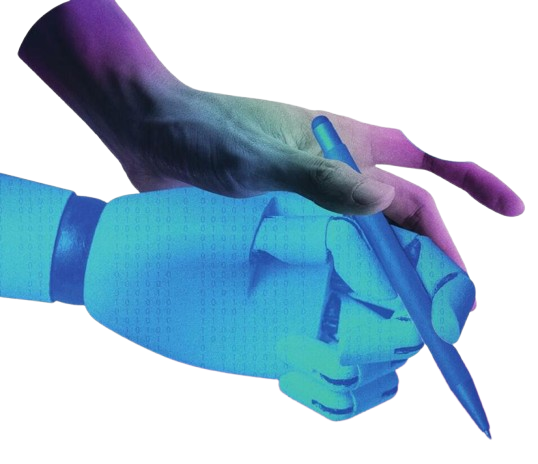Versuchen GOLD - Frei
The write stuff How human scribes are fuelling AI
The Guardian Weekly
|September 13, 2024
20,000 people work full-time to train’ models like ChatGPT. Here, a data annotator spills the beans on hisjob

Each week, I write for a tech company worth billions of dollars. Alongside me are novelists, academics and other freelance journalists. The workload is flexible, the pay better than we are used to, and the assignments never run out. But what we write will never be read by anyone outside the company.
That's because we aren't even writing for people. We are writing for an AI.
Large language models (LLMS) such as ChatGPT have made it possible to automate huge swathes of linguistic life, from summarising any amount of text to drafting emails, essays and even entire novels. These tools appear so good at writing, they have become synonymous with the very idea of artificial intelligence.
But before they ever risk leading to a godlike superintelligence or devastating mass unemployment, they first need training. Instead of using these chatbots to automate us out of our livelihoods, tech companies are contracting us to help train their models.
The core part of the job is writing pretend responses to hypothetical chatbot questions. This is the training data the model needs to be fed. The "AI" needs an example of what "good" looks like before it can try to produce "good" writing.
As well as providing our model with such "gold standard" material, we are also helping it attempt to avoid "hallucinating" - a poetic term for telling lies. We do so by feeding it examples that use a search engine and cite sources. Without seeing writing that does this, it cannot learn to do so by itself.
Hold on. Aren't these machines trained on billions and billions of words and sentences? What would they need us fleshy scribes for?
Well, for starters, the internet is finite. And so too is the sum of every word in every book ever written. So what happens when the last pamphlet and papyrus have been digitised and the model is still not perfect? What happens when we run out of words?
Diese Geschichte stammt aus der September 13, 2024-Ausgabe von The Guardian Weekly.
Abonnieren Sie Magzter GOLD, um auf Tausende kuratierter Premium-Geschichten und über 9.000 Zeitschriften und Zeitungen zuzugreifen.
Sie sind bereits Abonnent? Anmelden
WEITERE GESCHICHTEN VON The Guardian Weekly

The Guardian Weekly
ASSAULT ON THE SMITHSONIAN
Donald Trump has vowed to kill off 'woke' culture in his second term, and a major institution a few blocks from the White House is in his sights
16 mins
January 16, 2026

The Guardian Weekly
'Add blood, forced smile' How Grok's nudification AI tool went viral
A trend for the chatbot to alter pictures to show women in bikinis spiralled into hundreds of thousands of requests to create fake sexualised images, horrifying those targeted
5 mins
January 16, 2026
The Guardian Weekly
Two horrifying truths have been disclosed by a lying president
For a serial liar, Donald Trump can be bracingly honest. We've known about the mendacity for years - consider the 30,573 documented falsehoods from the president's first term, culminating in the big lie, his claim to have won the 2020 election - but the examples of bracing candour are fresher. Last week both began and ended with the US president speaking the shocking truth.
4 mins
January 16, 2026

The Guardian Weekly
Jude Law's Putin sent from Russia with love
Is a new film portrayal of the autocrat as a James Bond-like strategist merely swallowing Kremlin myths?
3 mins
January 16, 2026
The Guardian Weekly
The city of noodles fights for the crown
The road to ramen paradise ends in the unlikeliest of places. At Men Endo, located in a suburban street, next to a school and a low-rise apartment block, bowls of noodles disappear in a flurry of slurps, gulps and hurried but heartfelt exchanges of appreciation between customers and chefs.
3 mins
January 16, 2026
The Guardian Weekly
Rhetoric risks repeating Warsaw Pact mistakes
Donald Trump's echoing of Russia's talking points in its war against Ukraine has long been a cause for alarm and dismay in the west.
2 mins
January 16, 2026

The Guardian Weekly
Europe's options What can the EU do to counter Trump's designs on Greenland?
Diplomacy and Arctic security European governments, led by Denmark's ambassador to the US, Jesper Møller Sørensen, and Greenland's envoy, Jacob Isbosethsen, have been lobbying US lawmakers to talk Trump out of his territorial ambitions for the island.
2 mins
January 16, 2026
The Guardian Weekly
China first? Carney looks to mend broken ties with Beijing
As trade war with Washington takes its toll, Canada’s PM seeks to restore fractured relationship with China
3 mins
January 16, 2026

The Guardian Weekly
As the bombs fell, my family planted hope in a garden in Gaza
My 12-year-old brother Mazen ran into the kitchen, shouting that the aubergines were sprouting. He held up the tiny green shoots, his hands shaking. My older brother Mohammed and I rushed outside, laughing despite the fear that had become our constant companion.
2 mins
January 16, 2026

The Guardian Weekly
Can Havana's bond with Venezuela survive Trump?
On Havana's Fifth Avenue, where the trees and lawns remain groomed even as the rest of Cuba wilts, a billboard outside the Venezuelan embassy reads: “Hasta Siempre Comandante” (Until For Ever, Commander) next to a vast picture of a smiling Hugo Chávez.
3 mins
January 16, 2026
Listen
Translate
Change font size

